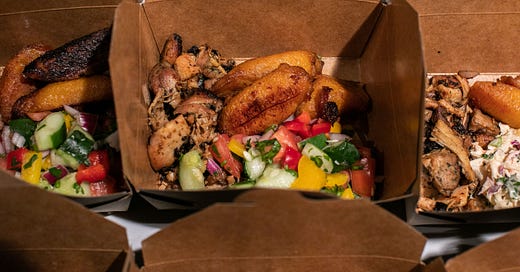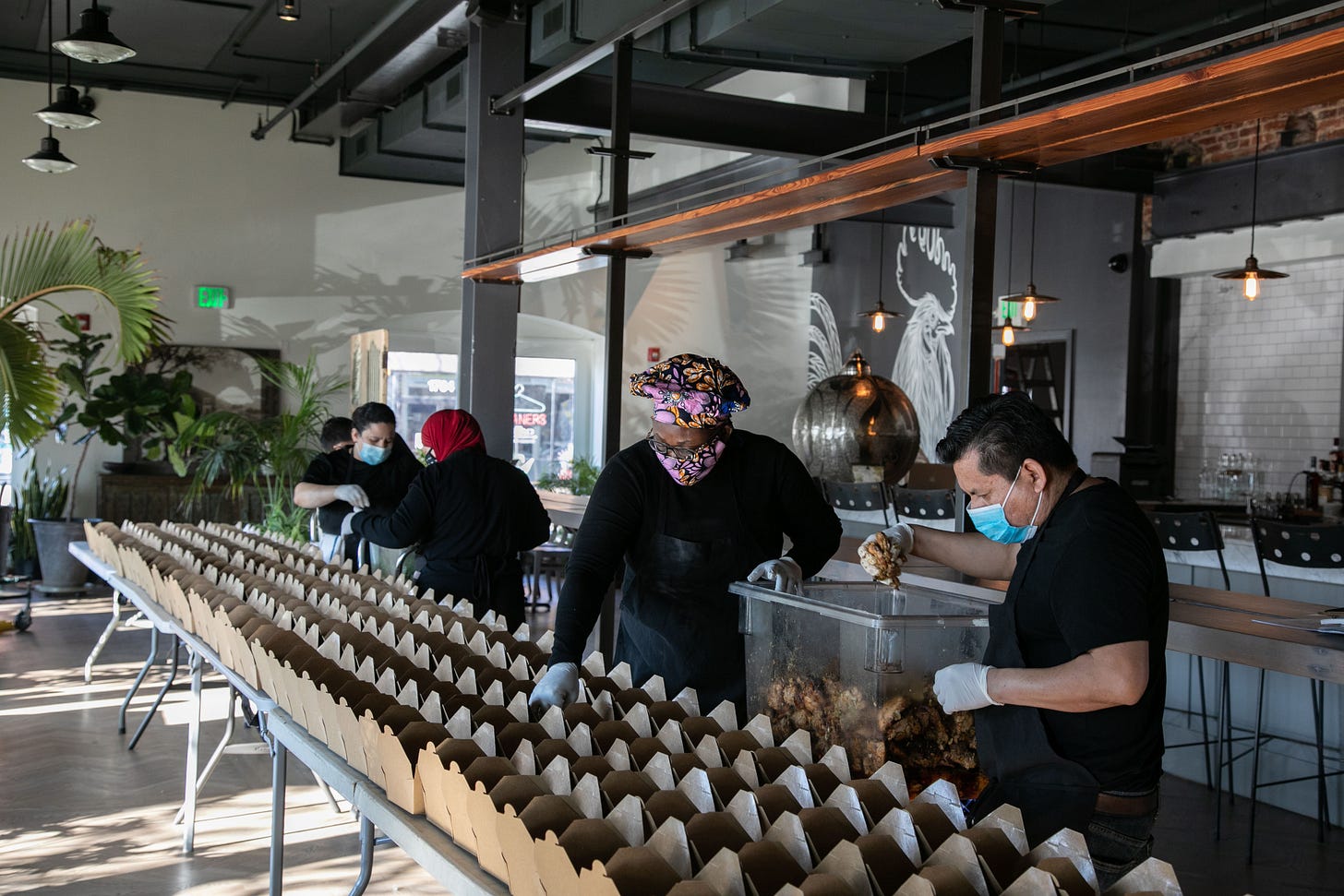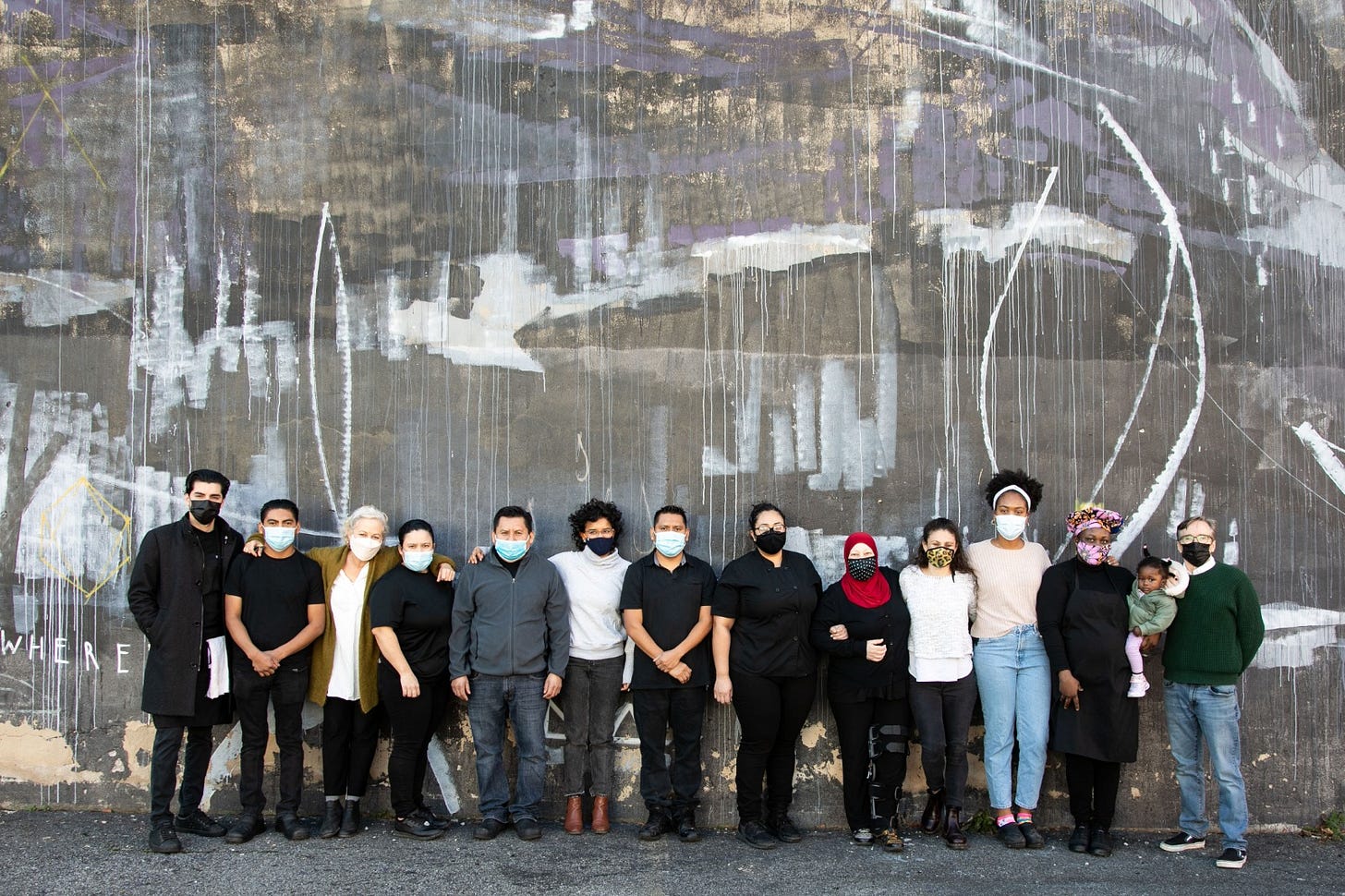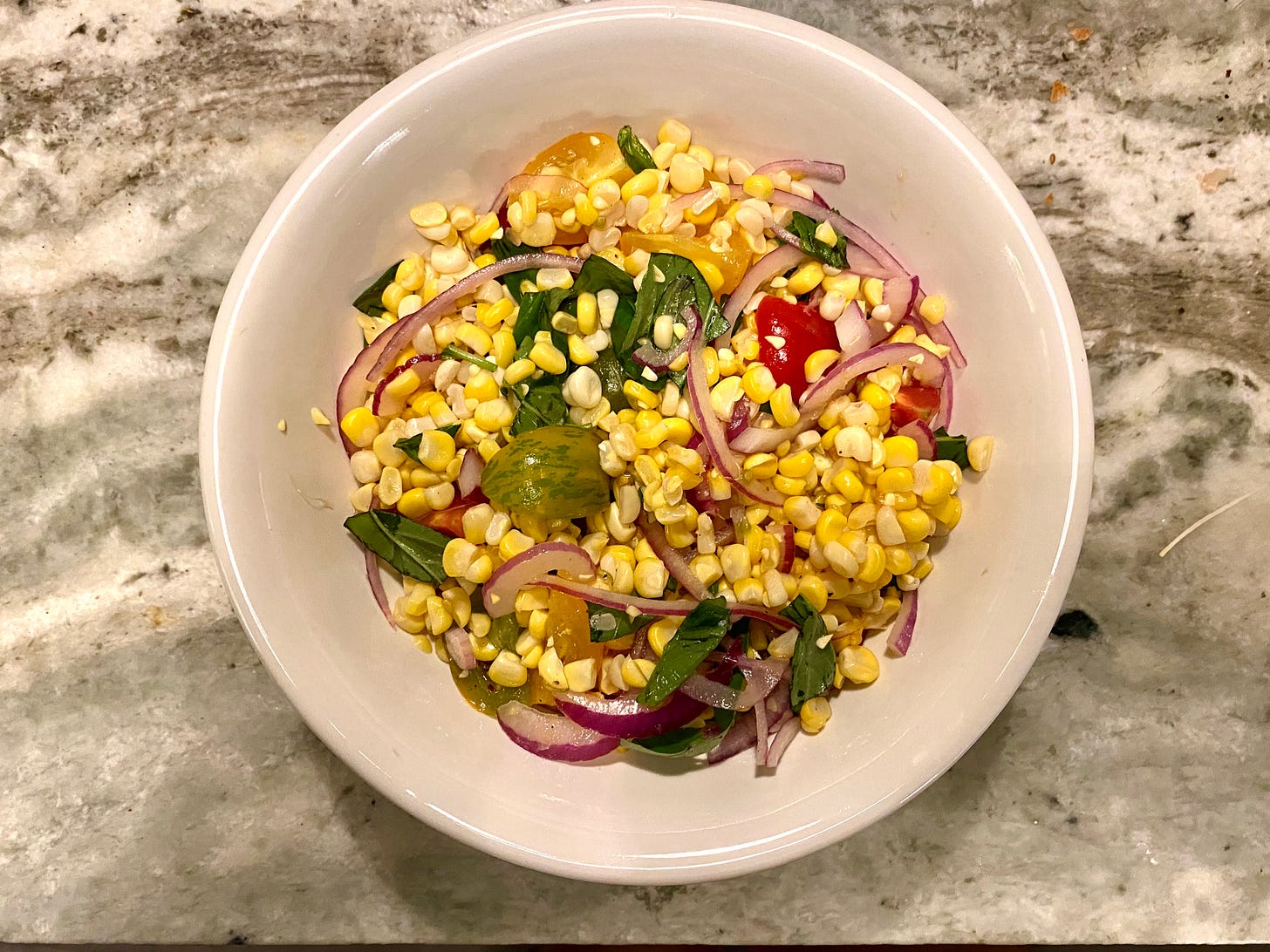A new (lasting?) model for local food equity
Alkimiah's emergency food initiative, launched at the start of the pandemic, prioritizes nourishing meals and worker solidarity.
Five days a week in Baltimore, the Alkimiah team starts cooking at 6:00 a.m. By 10:00 on a recent Tuesday, they had filled hundreds of cardboard takeout containers with roast chicken, couscous, and vegetables and garnished the meals with fresh herbs. The boxes were lined up on plastic folding tables set up along the bar at Alma Cocina Latina, ready to be folded shut and packed into plastic crates. Before noon, individuals began tapping on a side door, and team members loaded the crates into their cars so they could distribute the meals in low-income neighborhoods.
The system appeared practiced and seamless, which makes sense since the organization started feeding the city’s food insecure residents four days after COVID-19-related shutdowns began last March and hasn’t stopped since.
“Emily and I are very action-oriented, and it's very easy for us to get going,” said Irena Stein, describing the early days of the collaborative effort between her business, Alma Cocina Latina, and Mera Kitchen Collective, created by Emily Lerman.
In the beginning, when demand was highest, Alkimiah produced 750 meals per day, funding the operation with grants, private donations, and regular support from World Central Kitchen, which ended in April.
It’s one of many emergency food initiatives that was born in response to a pandemic-related spike in hunger. As traditional food pantries struggled to keep up with the demand for food, restaurants, food hubs, and all kinds of other organizations, businesses, and individuals approached the problem with various creative solutions. Common Market, a food hub that had never worked on hunger relief before, delivered close to a million boxes of fresh produce and dairy from local farms to communities in need. Individuals and organizations installed community fridges stocked with free food in cities all over the country. And World Central Kitchen helped activate shuttered restaurants and out-of-work chefs to get millions of meals to hungry families from coast to coast.
Now, as the country’s focus shifts towards a return to some kind of normalcy (whatever that means), Alkimiah provides one example of what innovation during a crisis can look like and how it might inform and shape better models for food equity and assistance going forward.
“Before the pandemic, we didn't think about doing this. We were involved with certain programs and participating in the community in other ways...but it made sense to completely change our vision for participation in the city as a restaurant,” Stein said. “So that's why we can think about doing this long term.”
Unwrapped
Mera Kitchen Collective was just hitting its stride as a catering company when all events were canceled in March 2020. Lerman was concerned about Mera’s team and about communities in Baltimore that even during the best of times lacked access to adequate food and resources. “We just knew there would be a need,” she said.
According to the Maryland Food Bank, 16 percent of Baltimore City residents are food insecure, but the city’s inequities related to healthy food access run deep. A Center for a Livable Future report found 25 percent of residents live in what it calls “healthy food priority areas,” where a combination of incomes far below the poverty level, lack of supermarkets, and little transportation makes food access incredibly difficult. Many experts and activists call these areas food apartheid zones; the report also found 31 percent Black of Black residents live in the priority areas, compared to nine percent of White residents.
Lerman launched a GoFundMe page and reached out to Stein, and workers from both Mera and Alma began immediately participating in the effort. And she contacted community leaders in various neighborhoods to help direct the meals towards families that needed them most.
In the beginning, the group thought they might keep it going for a few days or a few weeks, but once World Central Kitchen provided additional funding, Alkimiah became an ongoing initiative. And its founders approached emergency food with a new mindset born out of their experiences and passions—a mindset that prioritizes collective action over top-down systems and nourishing, thoughtful meals over fast, cheap calories.
Lerman not only created Mera as a worker collective, she also works for a Baltimore organization that provides technical assistance to other worker cooperatives. A lot of Alkimiah’s power, she said, comes from the fact that the team has real ownership over the meals they’re creating. “They make stuff that they like to make,” she said. “It’s not like having someone who comes in and you’re telling them, ‘Just put the cheese on the sandwich.’”
Meals change every day, and since it’s a multicultural team, that lends itself to variety, as they tap into their respective culinary backgrounds. They collaborate with the city’s Farm Alliance when possible to include fresh produce, and every dish is made from scratch, with care. It’s a far cry from handing over a box of canned fruit and dry pasta (although that approach has merits of its own, especially in dire emergencies).
The meals are also intentionally nutritious. Aside from being unprocessed, they’re made with quality ingredients and always include healthy sources of protein and vegetables. And to make sure they’re serving the communities who receive the meals well, Alkimiah solicits feedback and then tweaks the menu to feature more popular dishes or scrap recipes that don’t resonate.
For Lerman, it comes down to working towards “improving livelihoods at every step, from the people who are receiving food, to people who are working, to...where we can support farms,” she said. The question is, “How does that all work together?”
It’s a question they’ll have to continue to ponder as they figure out the future. When Stein had to relocate Alma Cocina Latina in the midst of the pandemic, she built in some permanent infrastructure by designing the kitchen to accommodate Mera Kitchen Collective’s catering business and Alkimiah. Alkimiah’s team makes its meals early so that the restaurant staff can start their prep for dinner service soon after they’re finished.
But Lerman and Stein are still figuring out how to fund the project going forward and how to quantify the need for what they’re providing as the country’s situation with COVID-19 evolves. Stein is talking to policymakers and other leaders about alternate sources of funding and creative ways Alkimiah can potentially loop in with other city efforts to alleviate food apartheid.
“We originally talked about trying it for five years to see what kind of impact that has, because if it’s just one year, you can see the impact during the pandemic,” she said,” but what happens when all these different things resume?”
Actually eating
I riffed on this Epicurious recipe and made a corn salad with all of my fresh summer produce this week. Instead of grilling it, I just boiled the corn briefly to soften it a little, added red onion, fresh basil, and tomatoes, and then tossed it all with olive oil, lemon juice, salt, and pepper.
Let’s be friends
Follow me on Twitter and Instagram to continue the conversation. See you next week!







